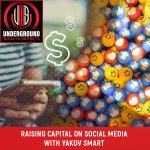Raising Capital On Social Media With Yakov Smart
- Post author By rldiamond
- Post date February 10, 2023
- No Comments on Raising Capital On Social Media With Yakov Smart

Utilizing new trends to connect and establish relationships is something that every business owner should be thinking. Twenty years ago, all fundraising happened in person. Now, social media changes that game for good. In this episode, Yakov Smart, the author of Disrupting LinkedIn, talks about raising capital using social media platforms. If you’ve got relationships, you’ve got leverage, and the money is in the leverage. When you need to close on a deal, you must be intentional in and build the pipeline. Dive right in this conversation with Yakov and learn how to use social media to your business’ best interest!
—
Watch the episode here
Listen to the podcast here
Raising Capital On Social Media With Yakov Smart
On behalf of Bob & Ed Diamond, I am very excited. I am going to be speaking with Yakov Smart who is joining us and sharing behind the scenes what’s working in his business, what’s not working, and what they are having a lot of success with. Yakov, welcome to the show. I’m so excited to have you here. What an honor.
I am so glad to be here, Julie. Thank you for having me.
Can you start off and tell our audience a little bit about yourself, your background, what you did, and what you’re doing?
I could tell my whole life story, but we’d be here for a while, so I’ll give people the cliff notes version or the 60-second version. I had been in the online space for a while. I started around 2014 or 2015. I started off and wrote a book on LinkedIn marketing and lead generation called Disrupting LinkedIn. I used to do a lot of seminars, speaking, and teaching business owners how to use LinkedIn to make money, go and find leads, build their personal brands, and grow their influence online.
In 2020, I started working with real estate investors, showing them how to use LinkedIn and other social media channels for raising private money, finding passive investors, and scaling their capital raising. I own a business called Investor Attraction Academy where we work with real estate entrepreneurs who want to scale their capital raising so they can buy bigger assets and grow their net worth faster.
I got to ask. The LinkedIn business that you did, did it lead to raising private capital?
Totally. Initially, out of the gate, people were looking for high-end clients. People started coming to me looking for high-net-worth investors who could be accredited investors in their deals. There was a natural progression. It has since evolved where we give people strategic plans for using not just LinkedIn but other social media channels and other online strategies for driving people in the door and building relationships with high-net-worth individuals at scale one-to-many. Probably like you, I’m big on one-to-many marketing and being able to do that through some of these channels.
You’re blowing my mind away. You’re saying through these social media outlet channels, you’re able to use some type of method to build a rapport with someone that eventually turns into a relationship where you’re raising private capital for your real estate deals?
Correct.
Why are people not using social media to raise private capital? I’m going to be honest here. I’ve raised private capital before and I’ve never thought of even utilizing social media. Tell me how that works. Why should investors be thinking or questioning themselves? If they want to raise capital money, what they should be utilizing on social media?
There are a lot of reasons. One reason is people don’t know what they don’t know. Not everyone wants to spend a ton of time on social media. I’m here to tell you that you don’t have to. Sometimes, investors, if they need to raise, let’s say, $250,000 for a deal, they may have a network already and be able to raise that money very quickly. A lot of people we work with want to raise millions. They want to have a pipeline of potential millions to pull from to take down those bigger deals. Those are a few of the reasons. Another reason is SEC compliance. No one wants to be the person who breaks the law and gets in trouble. We have to be compliant and build relationships.
The other piece is people don’t know how. People don’t understand you can systematize social media. I talked about this on my podcast where I like to be at the cause of social media, not the effect of social media. What does that mean? That means that there are people who will wake up in the morning, whip out their phones, and start scrolling social. They get consumed by it. They get consumed by the newsfeed and all the different distractions versus if you’re at the cause of it.
You’ve got systematic ways to tap into some of these channels, specifically LinkedIn, to start generating conversations much like you would at a conference or a networking event where you can meet people and build relationships. The key thing is we’re not raising capital on social media necessarily where someone is wiring you money through Messenger or by commenting on your posts saying, “I wired you 50 Gs.” It’s more about building the relationship there and then extracting people onto an email list or onto a phone call and being able to build the relationships and raise the money that way.
That’s interesting. Do you do this individually? Do you do it as an individual, or do you create a business page? Do you do it through LinkedIn? Can you use it on any social media platform?
Personal profiles are what tend to do the best. A lot of our strategies require no paid advertising, which is cool. Posting can be great. Direct messages are usually the quickest path to getting people to raise their hands and want to know more. It’s like, “I’m curious about that. Let’s talk. I’ll opt into whatever your lead magnet is or giveaway that you gather.” That is where a lot of that happens.
There’s inbound, which is through content and things like that, and there’s outbound, which is going out there. If you would imagine you were in a room of 300, 400, or however many people who are all high net worth individuals, you wouldn’t go up to them and say, “I’ve got a deal. Are you ready to write me a check?” That’d be stupid. You would say, “My name is so-and-so.” They’d ask, “What do you do?” You’re like, “I do this. What do you do?” They’re like, “That sounds interesting.”
Do you have a five-second pitch that you use when it comes to this conversation? When you get into the conversation about what you do and what they do, that opens the conversation. My dentist and my doctors love me. I sit there and talk to them. I’m like, “You could be earning an 8% to 9% interest on your idle money that’s sitting there.” Does that help you with the conversation and your pitch? I’m curious.
It allows you to grab someone’s attention. You’ve got to grab someone’s attention. There are some favorite ones. They’re like, “You help people invest in real estate without the headaches of being a landlord or doing any of the work. You help people recession-proof their investing all 100% hands off.” These types of things.
I always joke about this with marketing and messaging. There are only so many angles. There are only so many ways of saying the same thing. Why would someone invest in real estate? There is passive income, tax benefits, and all these different things increasing their net worth. They’re beating the stock market and protecting their legacy.
In our program, we call them Angles. There are different ways of saying those angles. At the end of the day, it’s getting someone to buy into what those benefits are through educating them. That’s where marketing comes in. Different people are going to resonate with different hooks. There are different ways to get their intentions.
I love your unique approach. I’m going to be honest. I’ve invested for many years and I’ve never even thought for a second to utilize my social media in that respect. It’s always been more of the old-school getting-to-know-people and getting-to-know-about them in relationships. This seems like a very streamlined process as well.
It’s all about doing it one-to-many. I’m big on systems. People, no matter what kind of business they have, should have systems and streamlined processes. It’s being able to build that trust and being able to grab people’s attention one-to-many like with anything else. I don’t know about you, but if I’m having the same conversation twenty times a day and repeating myself, it’s not as enticing to me.
You lose excitement. I understand that. What are some success stories you could share? Do you have any students that have utilized your system and whom you could share a story about?
One of our students, Matt, for example, is raising money to buy apartment buildings. He started the program a few months and he’s already got 30 to 35 new investors. These are people beyond his current network who are bought in and they’ve got checks that they’re ready to write. He’s doing less deals than maybe the person who is doing fix and flips, but it could still apply to the person doing fix and flips. He already had people wiring him money. He met these people on social media. It’s not because he’s been posting a bunch of stuff necessarily. It’s because he has been having those conversations, booking phone calls, and turning those relationships into capital.
Does the capital go straight to the individual raising or to the title company? How does it work in that respect?
Most people are syndicating deals. Some people are doing more of a fund model. Depending on that, that’s what determines that. When people invest, they’re investing in you and the deal. They’re investing in themselves and the returns that they’re getting. With that formality, a lot of people overdo it with the paperwork. They’re important paperwork, but before the paperwork, is the person bought in? Do they see the vision? What’s holding them back, and what’s their why behind even investing in the deal?
When people invest, they're investing in you. They're investing in the deal. They're investing in themselves and the returns that they're getting. Click To TweetThat makes sense. Once they sign up, do they share the deals, or do they share the deals that they’re raising private capital for based on their ads?
My stuff is all about building the investor database. Imagine you had 100 people on an email list. It’s like in wholesaling. You have a buyer’s list. Imagine that all these people are credit investors or high-net-worth individuals. Imagine you’ve had conversations with all of them. You know that some of them have money sitting in their 401(k), some of them have a liquid of $50,000 to $100,000 to invest, and some of them have considerably more.
Let’s say you’ve got a deal. I think of larger deals. That’s most of the people we work with, but this doesn’t necessarily have to be the case. Let’s say you need to raise $2 million. Let’s put that number out there. What do you do? You email marketing. You’re like, “We’ve got this deal. Here are the terms.” The staff commits. You have text messages and meetings specifically talking about the deal.
You’ve got this warm list of, let’s say, 100 people in this case. It becomes so much easier to raise that $2 million versus what most real estate entrepreneurs do. They’re like, “I need to raise $2 million. I’m going to try to put this deal everywhere. I’m talking about the deal with everyone and hopefully, be able to raise the money.” It’s a much more intentional approach. It’s having systems for being able to add investors and raise money.
I love that. What was one of the biggest learning curves when you were building out this system?
There are marketing agencies out there. There are people talking about marketing. There is a lot of great stuff. Understanding investor psychology is a little bit different than other products and services. What do people want? A lot of people talk about great returns and not enough people talk about reducing risks, getting people to trust you, and what the key points are.
It’s also making sure that we can automate as much as possible. The other thing that happens is let’s say you send someone a message on social media and they respond, we found there are different buckets of responses. When someone says this or when someone asks this question, what do you say back? It is having those if-when scenarios as we call them.
I like that. That makes sense. For our audience, if you’re interested in anything that we have discussed so far, you can go to UndergroundWealthSecrets.net/Capital. You’re an investor, too, and having success using this system. You have a lot of success with it. For me, looking at it, I’m like, “Wow.” Building the relationships and everything, I get it, but how nice must it be to know that you can look at deals and pretty much cherry-pick the deals that you want to invest in because you built up this incredible Rolodex of lenders.
It’s because you have relationships.
It’s all about the relationship.
There are also ways to come in. You can raise for other people’s deals and get paid a cut of that. If you’ve got the relationships, you’ve got the leverage. The money is in the leverage.
How many people work in your company? Do you have a large company?
We’ve got less than five people. I like to keep things lean. Some people grow their companies too big or they have too much pride in like, “We have this office. We’ve got a ton of employees.” I don’t care. I’m more about being lean. Automation, oftentimes, is one of the best employees because it works for you round the clock. I’m big on that. We have me, our operations manager, our customer success manager, my admin assistant, and then someone who does client relations.
I’m also big on specialists. For example, if I wanted to launch a Facebook ad campaign tomorrow, I go find someone who knows how to run Facebook ads. It’s also important for business owners to understand the strategy. What’s the big picture? What’s happening? What’s the messaging? There are very tactical things that someone can go and implement for you.

That’s been where I’ve shifted a lot of my mindset whereas before, I had to try to figure everything out on my own. I’m like, “I’m so smart. I can figure this out.” Now I want to be with people who are better than me. I’m a terrible admin person. I’m the worst. I’m terrible at doing admin stuff. That’s why we have someone doing admin stuff and some of the other assistant stuff. I’m big on the big-picture vision and understanding how the piece has come together.
It seems like you’ve got a great system in place. What are some of the best ways that real estate entrepreneurs can stand out to potential investors online and on social media?
We hear a lot about personal branding. Personal branding is very important. It’s also overrated. People try to create a personal brand when they’re not out there building relationships. You invest in personal branding, but how many conversations are you having? How many eyeballs are you getting? You can have the prettiest-looking website and the best branding in the world, but if no one ever comes there, what’s the point? You’re tooting your own horn.
For standing out, messaging is going to be important. These are some very tactical things. It can be online on Facebook, LinkedIn, and some of these other platforms. It is having great headlines. You don’t want to see an elevator pitch, but specifically, get someone intrigued and learn more about what you do. Another powerful thing is considering what some people’s objections are and why wouldn’t they invest with you and addressing those in your content or social media profiles. If they’ve got a big objection, and we call them elephants in the room, why not address that? Your competition probably is. They’re talking about the great returns, which is what everyone is doing.
Another way to stand out is to be consistent. That’s a big thing, too. It’s being consistent with your messaging flow, with what you’re posting, and that type of thing as well. Also, I don’t want to say be yourself because that’s a piece of cliché advice. If someone can go and look at your messaging, take it, copy it, and paste it, and they’re doing the same types of deals and it fits for them, too, you’re doing it wrong. It’s got to be something people can’t knock off. It’s being able to tell your story. In every point you’re making, you’re tying it back into, “What’s in it for the other person? What’s relevant to them?” instead of, “This is my background.” At the end of the day, people care about what’s in it for them. You’ve got to make yourself relevant.
People care about what's in it for them. Make yourself relevant. Click To TweetThat is true. This is a whole new perspective because I’ve always been on the other side, raising private money. I’m so excited about this because I’ve never utilized this. I’m going to be honest. I didn’t know you could do this. What are a few of your recommendations for people starting out with social media to find investors without breaking SEC laws or sounding salesy and not liable?
We don’t want to break SEC laws. I’m not an SEC attorney. Consult with an SEC attorney before you do anything, first and foremost. The very first thing is don’t pitch your deals in direct messages. It’s not about going out there, cold soliciting potential investors, and saying, “We don’t know each other, but I’ve got a deal. Do you have $200,000?” It’s a long-term approach. We’ve got to build the pipeline.
This isn’t something where if you need to close on a deal within 24 hours and you’re going to say, “I’m going to hit up everyone on social media,” it’s not intentional. We’ve got to be intentional. We’ve got to understand, “We want to get people indoctrinated first.” You want to build relationships first. Understand who you are and that you’re going to be raising money. Understand how much capital they’re working with or could be working with.
A lot of people don’t know, for example, they could invest through a self-directed IRA. If you’re the one who sheds light on that, that’s a huge value add. You’re giving people a lot of value. The very first thing is getting to who is it that you want to target. I use the word target loosely. Who is it that you want to have conversations and relationships with? If you don’t want to talk about money with people who don’t have money, that’s an issue. Where are you going to find them? What channels are you going to use? Most of our clients are using LinkedIn, Facebook, and some other channels.
What are the places you can be where you’re the only game in town? This is something that I’m big on in terms of my marketing philosophy strategy. It is being the only game in town. I’ll give you an example from everyday life. In 2022, on Christmas, I wanted to go have lunch somewhere. A lot of things are closed on Christmas. However, there was this one diner near me that was open. It was a nice diner. It was open, but it was the only game in town and was flooded with people. There was an hour’s wait. It’s being able to do that in your marketing when you talk to investors on how you can differentiate your investment approach, types of deals you’re doing, who you are, and how you can create something where they feel like they’re drawn to you or they feel like there’s something you have in common.
It’s also having a strategy on top of things. Understanding that posting can be great is a whole different conversation. It’s a layer on a bigger-picture strategy and it’s not the only thing. A lot of people get frustrated trying to post content and they’re like, “It doesn’t work.” It’s not that it does or doesn’t work. First of all, it’s missing the big-picture strategy and foundation. Those are a few of the things. It’s making sure that you understand it’s not about how much time you’re spending on social media. You could spend a lot of time and not get anywhere. You could also spend very little time using systems and automation and make tremendous progress.
That makes sense, too. We spoke earlier and you mentioned something about an Investor Attraction Webinar. What’s your definition of an Investor Attraction Webinar? What would make that such a powerful tool for people to use in their investing business to raise more capital?
A lot of people reading know what a webinar is. It’s an online presentation. The cool thing about an Investor Attraction Webinar is it’s not deal-specific. It’s not to pitch a specific deal where you need to raise. That’s a different type of webinar. It is an introductory webinar. I’m taking 15 to 25 minutes to educate people about passive investing. For example, one thing a lot of people don’t know is they can go and put some of their 401(k) in alternative assets if they do a self-directed IRA. You’re mentioning that, sharing a little bit of your story, establishing that rapport, and doing that one-to-many. It’s being able to do those things.
The great thing about these webinars is you can automate them. They can be pre-recorded. You have this presentation. Imagine you’re on a call with someone who’s a potential investor. We do this with all our stuff. Before the call, they watched an intro video or your Investor Attraction Webinar. They know a little bit about you. Those FAQs and questions that they’re going to ask you, you’ve answered in advance. It takes a lot of the pressure off the selling process.
You can get rid of all the rebuttals in your webinar.
You can educate those in the Investor Attraction Webinars. It’s a powerful tool. People can deliver it live as well. If you’re asked to speak somewhere, you take that same structure. There’s a whole psychological framework to it. You’re not just over-educating people and pouring in a ton of information. You’re giving them very specific things. They’re going to inspire action. That’s the biggest indicator. Does it inspire action?
I like that. This is exciting. I’m used to the old-school ways, like participating in places where most people have a high net worth if they’re affiliated with certain things. That’s always been the key in my little local Texas town. This is a streamlined process that I’ve seen like no other. What would you say to our readers if they’re somebody starting out or even seasoned that’s an investor in buying properties? What is some advice or feedback you would give our readers?
I would say start with the end in mind. Reverse engineer what you can. It’s not necessarily about doing more. It’s about maximizing what you’re doing, even with the relationships. You might have relationships with people that you haven’t talked to in years, but they could maybe invest with you. You might have podcasts like this where you’ve got a relationship with someone that could come on and be a guest. It’s getting those little wins.

The biggest thing, too, is to understand when it comes to capital raising, we’re in a great time to do it no matter where the economy goes. The stock market got hit pretty badly in 2022. It’s a great time to be educating people and building those relationships. There are going to be some great deals coming your way in the next 12 to 24 months. They may be some of the best deals that you’re going to see in a while. It’s never too early to get started. The saying, “Have a great deal and the money will come,” is complete BS. Anyone who’s got some experience knows that’s not the case. It’s a matter of building the relationships first, getting the deals, and raising the money.
Thank you so much. Before we close out, I got to ask this. Is there any one person or role model that was most influential in your life that guided you to being an entrepreneur in general? Did you know you always wanted to be an entrepreneur or did you realize as you were growing up, “Maybe this is the best road for me?” You’re successfully running a business, so I’m curious about that.
I don’t know if it was one specific person. I always knew. I had a feeling in my gut as a child. There wasn’t any one specific person I was like, “I want to be like them. I want to be an entrepreneur.” I always thought being an entrepreneur, there was an opportunity to make more money. I understood that. It made a lot of sense to me. That was always in the back of my mind. I didn’t have any of my family whom I knew was an entrepreneur. It’s not like that’s where that came from. When I was a teenager, I got into reading more books, understanding psychology, and all these different things. I was inspired by a lot of the people out there.
This is an odd story. I don’t know where this came from, but I was maybe 6 or 7 years old. I walked by. There were these two girls. This one girl, I knew she rode my bus. I was like, “It looks like they’re having a conflict. I wonder if I could charge her money and show her how to resolve that conflict.” It was this dumb idea. I never did anything. I don’t know where that came from. I was like, “I see a problem. I could make some money that way.” That was something that was there from somewhere.
That’s incredible. There is one last thing. If you could recommend one book, what book would you recommend for any entrepreneur, seasoned or new? Someone getting started or seasoned in real estate or in business, in general, if you could recommend one book, is there any one book that you would always recommend or highly recommend for our readers?
I can’t recommend just one. That’s a tough question.
I know. It’s hard.

Can I recommend three?
Yes. You could recommend three.
Let’s do three. These aren’t in any particular order. These are three that are valuable. Buy Back Your Time by Dan Martell. It’s a newer book. It came out in January 2023. It’s good. Especially for seasoned entrepreneurs or new entrepreneurs, it’s a great foundation, too. There are lots of gems in there. There’s a book out there that’s called Sleep Smarter. It’s by a guy named Shaun Stevenson. It’s all about how to sleep better. Sleeping well is such a big part of life, especially for entrepreneurs. We don’t have superpowers.
The third book, I like this book, is called Magician Vs. Mule. It’s by a guy named Mark Evans DM. It’s all about leveraging systems. Those are three that no matter where someone’s at in their journey, and even if you’ve read them before, there’s value in rereading them or reminding yourself and implementing different parts of them. It’s always a journey. It’s this ongoing evolution that we have.
It’s a whole new year but I feel like I’m in a whole new place personally and professionally already. I feel like I’m focusing on different things as the year has come about and changes have come. I appreciate you sharing those three books. In closing, do you have any final words before we close that you’d like to say to our audience?
No. I appreciate everyone being here. Reach out. I’m always all about building relationships. I always appreciate when people are tuning into shows, improving themselves, and wanting to grow. There’s never a limit to how far you can go.
I agree. Thank you so much. It’s been such a pleasure meeting with you.
Thank you.
Important Links
- UndergroundWealthSecrets.net/Capital
- UndergroundWealthSecrets.net/FreeCourse
- UndergroundWealthSecrets.net/FacebookPage
- UndergroundWealthSecrets.net/TikTok
- UndergroundWealthSecrets.net/YouTube
About Yakov Smart
 Yakov Smart is considered to be the leading expert when it comes to attracting high
Yakov Smart is considered to be the leading expert when it comes to attracting high
net-worth investors and raising capital online. He’s the author of Disrupting LinkedIn
and a sought-after authority by top RE entrepreneurs across the US and Canada. To
date, Yakov’s innovative strategies and systems have resulted in tens of millions of
private capital raised to fund real estate deals.
Yakov has shared the stage with Samantha Debianci of Bravo’s hit TV show, Million
Dollar Listing and been a guest on numerous media outlets. A resident of Scottsdale,
Arizona, today Yakov is the proud leader of Investor Attraction Academy, where his
programs give RE entrepreneurs proven tools and techniques for raising more capital
and finding investors beyond their current networks.







